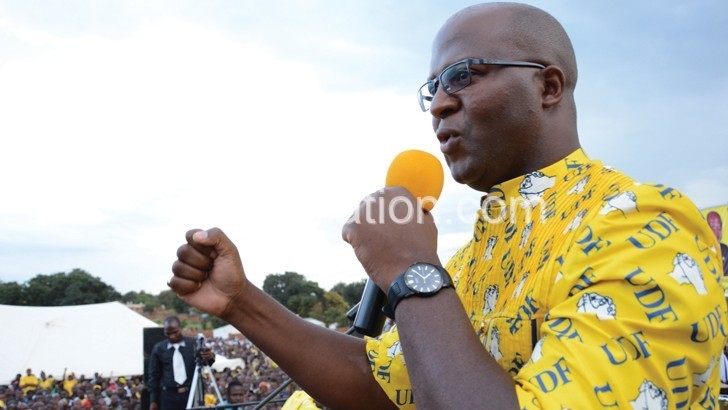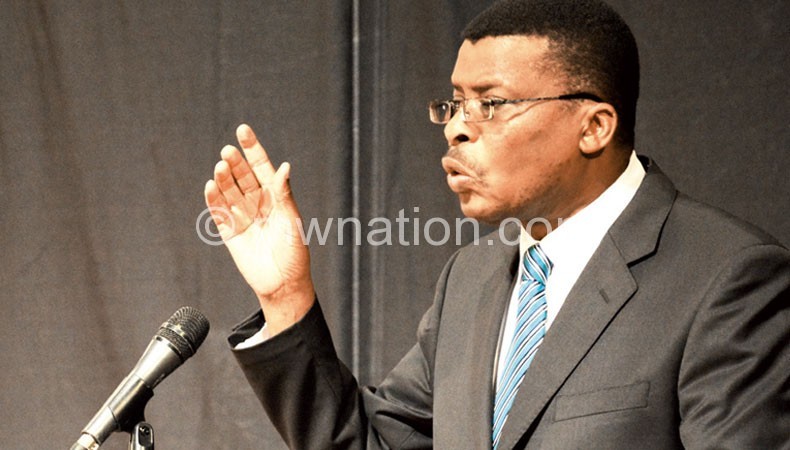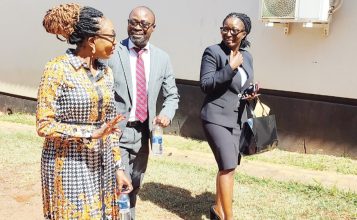Presidential hopefuls give up
As the 2019 Tripartite Elections draw nearer, five of the 12 presidential aspirants that contested in 2014 polls have pulled out of the race.
While five other aspirants appear to be on course to take one more shot, the remaining two are non-committal on whether to have a go by themselves or join forces.

Among the prominent leaders that have given up are lawyer Kamuzu Chibambo of People’s Transformation Alliance (Petra) and George Nnensa of Malawi Forum for Unity and Development (Mafunde).
The United Independence Party (UIP) and New Labour Party (NLP) have also surrendered while Chipani Cha Pfuko (CCP), ‘disbanded’ after its leader Davies Katsonga, who won the Mwanza Central parliamentary seat, joined the governing Democratic Progressive Party (DPP).
With just seven months before the elections, Umodzi Party’s John Chisi and Mark Katsonga Phiri of People’s Progressive Movement (PPM) could still not reveal their positions.
From the 2014 presidential contestants’ list, president Peter Mutharika of DPP, Lazarus Chakwera of Malawi Congress Party (MCP), Joyce Banda of People’s Party (PP) and United Democratic Front’s (UDF) Atupele Muluzi are the only ones set for the showdown.

The four parties amassed 36.4 percent; 27.8 percent; 20.2 percent and 13.7 percent respectively during the country’s first tripartite elections.
The other three 2014 presidential hopefuls–UIP’s Hellen Singh and James Nyondo of National Salvation Front (Nasaf) died in April 2017 and July 2015 respectively while Friday Jumbe who represented NLP quit politics after his loss.
But, according to Nasaf acting president Reverend Laudon Malingamoyo Phiri, the party is set to join the premier race in 2019.
Besides the five, three others representing newly unveiled parties—Vice-President Saulos Chilima of United Transformation Movement (UTM), Peter Mbakuwaku Kuwani of Mbakuwaku Movement for Development Party (MMD) and South Africa-based Sally Kumwenda-Yadwad of the Leadership with Compassion Party (LCP), have also publicly expressed desire to run for the presidency.

In separate interviews, Chibambo and Nnensa said they have no ambitions to stand as presidents next year and will support the thought to partner with other parties, and field one candidate.
“We support the initiative for political parties to work together. It is for the good of the country as it will help the electorate to determine which direction to take in terms of voting. Too many political parties and contestants bring confusion,” said Chibambo.
Nnensa observed that the 2014 situation, where 12 faces were on the ballot paper, was unhealthy as voters failed to properly make their choices.
“We would rather help in streamlining the number of candidates so that the electorates can focus on the few candidates,” said Nnensa, who led six political parties in 2014 under the banner of Tisintha Alliance.

The alliance comprised Mafunde, New Republican Party (NRP), Republican Party (RP), Congress for National Unity (Conu), Malawi Democratic Party (MDP) and National Unity Party (NUP).
UIP spokesperson Asante Masache said besides their dismal performance in 2014, government’s failure to operationalise the newly passed Political Parties Act was another factor that forced them not to field a candidate.
He said supporters of UIP, which in 2014 was represented by its founding leader Hellen Singh, would in the 2019 polls rally behind a PP candidate.
While not clearly giving his party’s position, Chisi said they were doing everything possible to sustain themselves and move forward.
“Even if it means working with other parties with good vision, we will work with them because we don’t want to die, but become part and parcel of this country,” he said.
But some political analysts have warned that it would be premature to conclude that the leaders would challenge each other as a number of secret top-level discussions have been taking place among some of them.
While the parties’ unwillingness to field candidates also comes against the backdrop of their narrowing popularity, University of Malawi (Unima) political scientist Mustapha Hussein observed that the development may result in fewer presidential aspirants and several coalitions.
“The current scenario indicates that most of the parties will band together and present one presidential candidate. This means fewer choices for the electorate and also intense competition among the candidates,” he said.
But Ernest Thindwa, another Unima political scientist, observed that the possible reduction in the number of presidential contenders was a signal for national evolution of the country’s democracy.
“That most parties will not participate should not be a surprise. This is because wherever the First-Past-the-Post system is used as an electoral system, the number of parties is reduced to two.
“In Malawi, if it were not for the factors of regionalism and ethnicity, by now we should also have had only two major political parties. So, this is a national evolution of our democracy by virtue of us adopting our current system,” he said.
Thindwa further observed that had the country adopted the 50+1 electoral system, more candidates would have been joining, instead of withdrawing from the race.
There are over 50 registered political parties in Malawi, but a Nation on Sunday analysis shows that about 80 percent of them do not field presidential candidates with only about 40 percent contesting in parliamentary and local government polls.
During the May 20 2014 polls, only 17 out of 54 political parties in the Registrar of Political Parties’ books fielded parliamentary candidates in all or some of the 193 constituencies.
However, with the new Political Parties Act, which was passed last year, but is yet to come into force, about two thirds of the already registered parties will be on their death beds.
This is so because Section 16 of the Act gives the Registrar of Political Parties powers to deregister a political party if, among other things , it fails to secure a seat in parliamentary elections or a minimum of five percent of the national votes.
The party can also be deregistered if it fails to at least win two seats in local government elections or 10 percent of the total votes in the local government elections.
Minister of Justice and Constitutional Affairs Samuel Tembenu indicated last month that the process of operationalising the Act was almost complete, but could not commit to when, precisely, the law will be gazetted.





